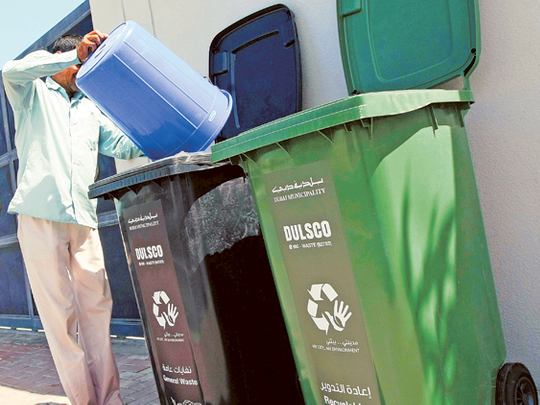
Dubai: Dubai Municipality has further extended its waste management initiative by providing around 15,000 waste recycle bins across different areas in the emirate with hopes of making Dubai a greener city.
The initiative called ‘My City My Environment’ was launched in 2012 by the waste management department of the civic body, which has continued with its second phase this year, which aims to segregate all kinds of waste in Dubai by providing recycle bins free of cost to households across all areas in the emirate.
As part of the second phase, areas like Jumeirah 1, 2 & 3, Al Safa 1 & 2, Umm Suqeim 1, 2 & 3, Al Manara, Umm Al Seif and Al Barsha 2 & 3 have already received two colour coded green and black bins with clear instructions for residents on how to segregate the waste.
“Dubai Municipality’s goal is to always segregate waste from the source. We have a target to divert as much as we can by 2030 and to take advantage of the waste available. And so what is important for us is to get people into the habit of reducing their waste and to get them to know how to segregate,” said Abdul Majeed Abdul Aziz Saifaie, director of Dubai Municipality’s Waste Management Department.
The current waste management companies distributing the waste bins and then collecting the waste directly from households include Trashco, Dulsco and Averda.
Each company has provided the areas they are handling with two 240-litre coloured bins. The green recycle bins are meant for waste that can be recycled, such as cardboard, plastic containers, glass and cans, while the black bins are for all other types of general waste.
Rekha Philip, assistant manager, marketing and customer service at Dulsco, said that Dulsco is currently handling waste management and recycling services in Jumeirah 1, 2, 3 and Safa 1 & 2. She says that the majority of the residents in these areas have been following the bin instructions; however, regular awareness campaigns will continue in order or see more participation from residents.
“Segregation of waste at source is very important in reducing waste reaching the landfill. Majority of the waste collected can be only recycled if it is segregated at source. Once the recyclables are mixed with general waste, recyclables could get contaminated for recycling.”
“People have the notion that waste is non-recyclable and cannot be used further. Recycling in a way is resource recovery and thus saves valuable resources from being exploited. It not only saves resources but also saves lot of energy that is otherwise required to produce virgin materials. Preventing recyclables from reaching landfill saves on landfill space, thus prolonging the landfill life,” she continued.
Al Saifaie said that although the idea of segregating and sorting waste at source is not completely new for people, “what we need now is for people to cooperate and participate with us”.
“We have all our trust in our residents, and we encourage all to follow the plan,” he said.












